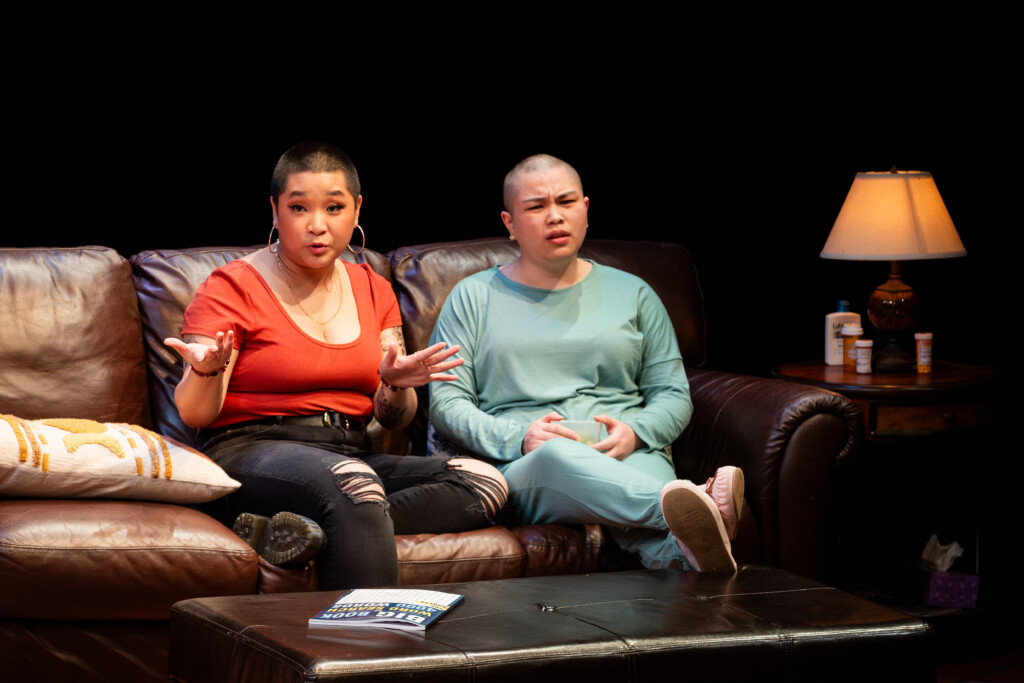It is a familiar American story: two siblings grieving the death of their mother are discussing and arguing about what to do with her body. In Vichet Chum’s play Bald Sisters, that familiar story expands to an elucidating emotional epiphany about how we engage with and view our neighbors, especially immigrants who have escaped horrifying circumstances in their homeland and who hope to be seen as more than victims and survivors.
Bald Sisters is given a marvelously acted and emotionally satisfying regional premiere in a production by Salt Lake Acting Company (SLAC), which continues through May 5.

Photo Credit: Todd Collins.
Directed by Seonjae Kim, SLAC’s production is filled with generous servings of laughter, sincerely portrayed emotions and meaningful takeaways that reach well beyond the contours of the playwright’s own family history and experiences as a Cambodian American.
Set in Carrollton, Texas in the middle of the last decade, the story puts the sisters, Him (Wendy Dang) and Sophea (Audrey Pan) at the center. Him and her mother, Ma (Keiko Shimosato Carreiro) still carry the memories (and the trauma) of The Killing Fields era in Cambodia, when Pol Pot’s Khmer Rouge regime carried out genocide while eradicating virtually all of the country’s social and cultural roots. While the younger Sophea was spared the worst experiences, she engages cultural traditions and Buddhist rituals of Cambodia. Him, who is married to Nate, a pastor (David Knoell), is undergoing chemotherapy for breast cancer. When she goes for treatment, Seth, whose family fled the Syrian civil war, accompanies her. Seth, who also cuts the grass at her home, has connected to Ma, who is delighted that she has someone to share her wisdom with, as well as her love of karaoke. Ma dies at the beginning of the play but her character reappears frequently throughout the play in smartly structured flashbacks.

Photo Credit: Todd Collins.
The characters reflect basic dynamics of Chum’s family history. Chum, who grew up in the same Dallas suburb where the play is set, is the son of Cambodian parents who came from different parts of the country. His parents did not know each other when they fled after the Khmer Rouge regime collapsed in 1979. Before coming to the U.S., they were in refugee camps in Thailand and the Philippines, where they met. However, their respective journey to the U.S. was sponsored separately, with the father landing in Virginia while the mother, who was accompanied by extended family members, resettled in Texas. Chum’s father would eventually move to Texas and marry his mother. Throughout the play, there are numerous bits of humor, recipes, mentions of cultural traditions and anecdotes about the bigotry which relatives encountered, all of which reflect the dynamics of Chum’s own large immigrant family that lived under the same roof.
The actors in the SLAC production do an excellent job in portraying these dynamics, along with aspects that define and sharpen the contentious relationship the sisters have. As Sucheng Chan summarized in a compact recounting of the history of Cambodian immigration in the U,S., the refugees navigated two challenges: “first, how American society has received and treated them, and second, how their own history has engendered hardships that few other immigrant groups have ever had to face.” Dang, who portrays Him, and Pan, as Sophea, effectively extract the full dimensions of these twin challenges, in their emotionally charged dialogue.

Photo Credit: Todd Collins.
Likewise, Chum, in an interview published last year in Theatre Journal, said, “As Cambodian Americans, we are so much more than four years of war. We are so much more than the product of U.S. intervention. We are so much more than struggles to assimilate suggest. There are a multitude of stories within our community, and I am trying to move narratives about Cambodian Americans forward.”
Indeed, the opening night performance of the SLAC production visibly connected with the audience, given its enthusiastic response and sustained applause. It was one of the company’s best opening night performances this critic has seen within the last six years.

Photo Credit: Todd Collins.
It is immediately apparent how Chum channeled many vibrant and vivid memories of the women who were present during his formative years through the characters of the sisters and their mother. Ma is vivacious, loving and straightforward, with an attitude that evokes the saying, “like water off a duck’s back.” The end of the play is elegantly symbolic, suggesting that the darkest clouds of a profoundly horrific past can be lifted. And, it is not only for those who survived the atrocities but also for those who grew up in families where that legacy of trauma lingered and caused great friction in the relationships and various aspects of their formative years.
Augmenting these points, with solid edifying effects are the two male characters. Despite his admirable intentions, Nate, Him’s husband, is awkward in moments when a spouse’s most authentic empathetic support could ease tensions in their marriage and the personal crises they have endured. Meanwhile, Seth instinctively knows how to be genuinely empathetic, especially because he has experienced similar challenges as part of a Syrian refugee family staking their lives in a new land. Both actors — Knoell as Nate and Kalled as Seth — round out the ensemble with fine results.
For tickets and more information about Bald Sisters performances, see the SLAC website.
